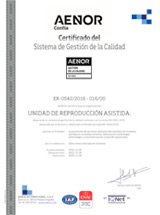Can endometriosis be diagnosed?
It is a disease that becomes progressively more complicated with age, which is why it is very important to detect it at an early fertile age. The diagnosis of endometriosis is suspected by the symptoms presented by the patient: chronic pelvic pain, pain with menstruation, urinary and/or bowel symptoms, difficulty in getting pregnant; the physical examination and an ultrasound scan showing cystic formation in the ovaries, or with a nuclear magnetic resonance in cases of deep endometriosis and involvement of the rectum.
The cause of infertility is that it affects the ovary, hindering normal follicle development and oocyte maturation; it can even prevent ovulation. When it appears in the uterine tubes, it hinders tubal permeability, making it impossible for the egg to pass through the tube when it is released from the ovary, so that it is neither fertilised nor reaches the uterus.
Another cause is due to alterations in the immune system, which can affect endometrial receptivity and embryo implantation, as the increase in cells that form the autoimmune system causes the sperm and egg to be identified as foreign cells and attacked.












